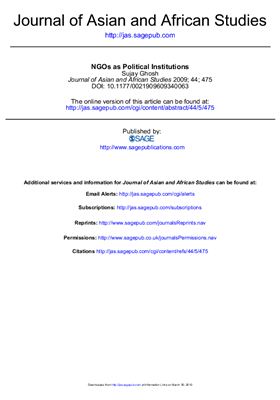Abstract
Institutions are essentially broadly agreed norms, rules and routines. They might
have arisen out of social conflicts with strong influence of power relations, but
they also face the demands of democracy. While studying NGOs as political
institutions, particularly in the context of a number of developing countries, this
article argues that the political context of their action is determined by their
relationship with the donors and social movements. Second, NGOs promote
democracy when they redefine participation in terms of their relationship
with state and society; and contribute to improve the quality of participation,
although with much less success in promoting inteal democracy.
Keywords democratization donors NGOs participation political
institutions social movements
Institutions are essentially broadly agreed norms, rules and routines. They might
have arisen out of social conflicts with strong influence of power relations, but
they also face the demands of democracy. While studying NGOs as political
institutions, particularly in the context of a number of developing countries, this
article argues that the political context of their action is determined by their
relationship with the donors and social movements. Second, NGOs promote
democracy when they redefine participation in terms of their relationship
with state and society; and contribute to improve the quality of participation,
although with much less success in promoting inteal democracy.
Keywords democratization donors NGOs participation political
institutions social movements

